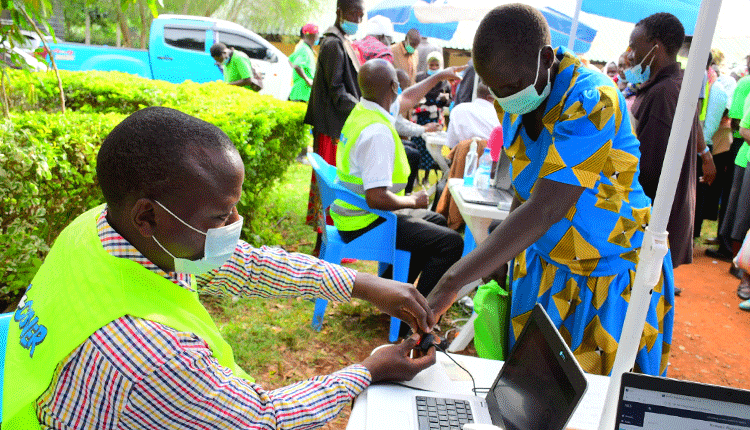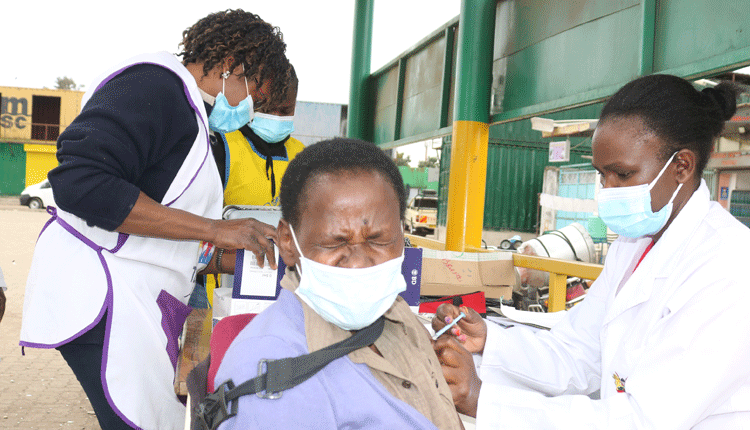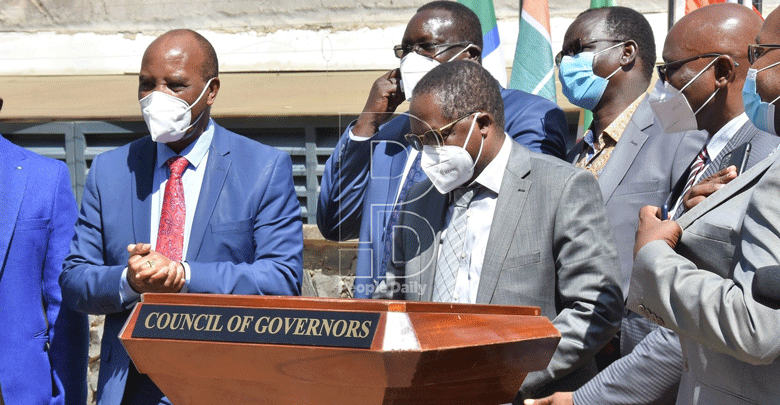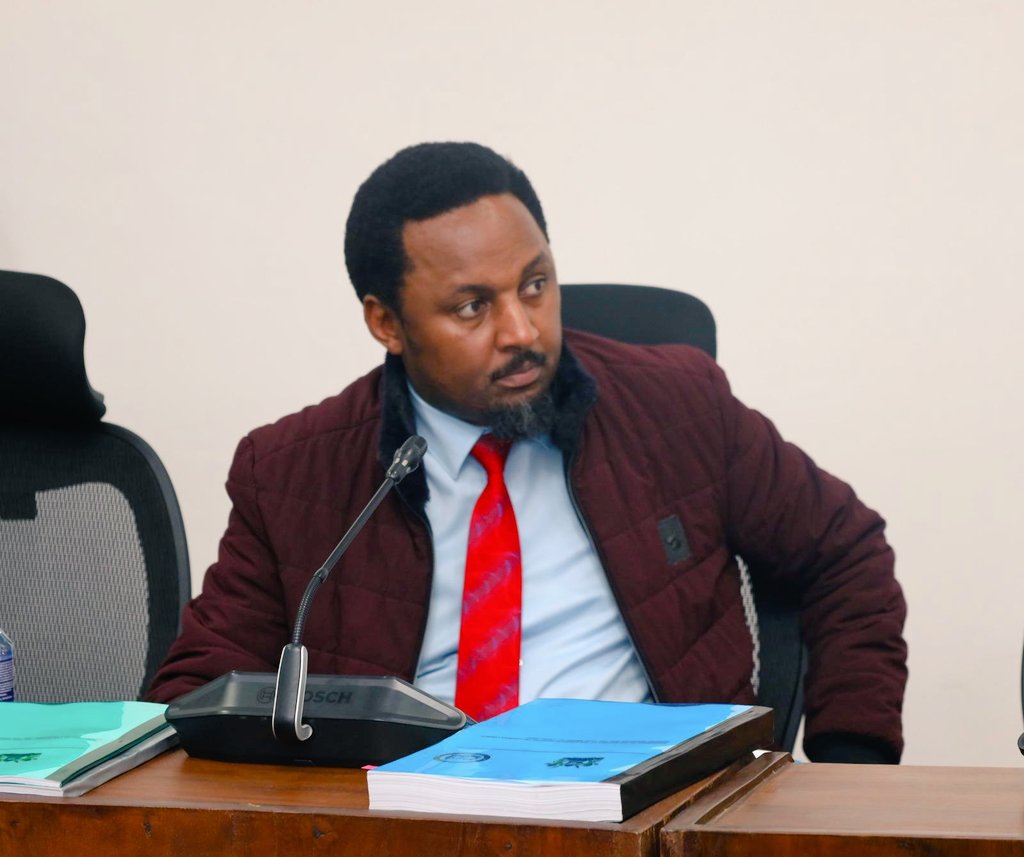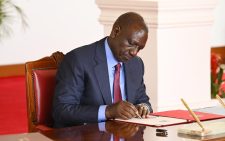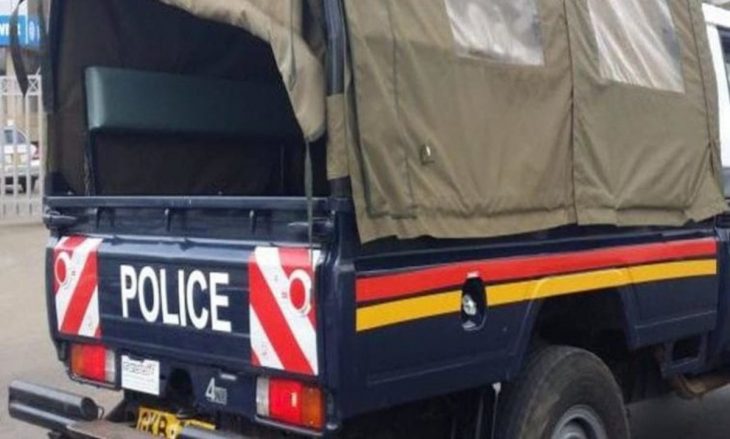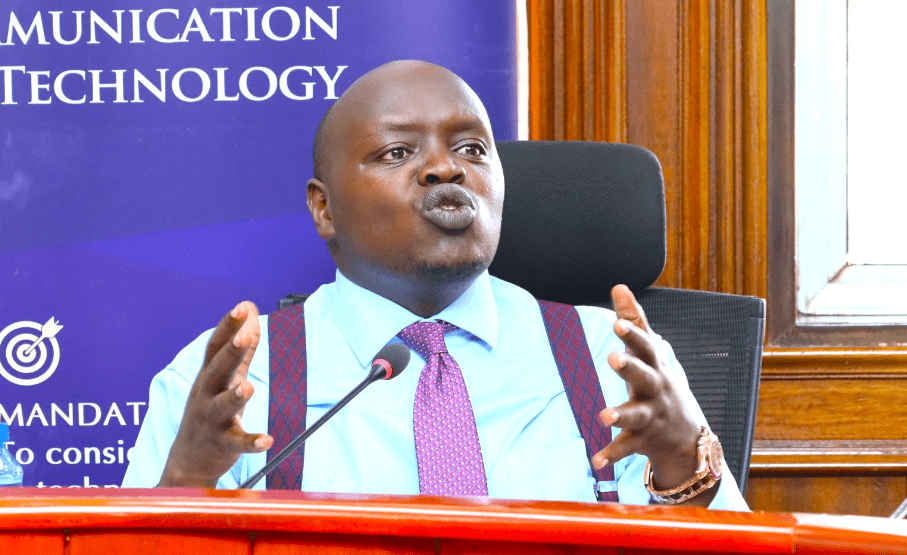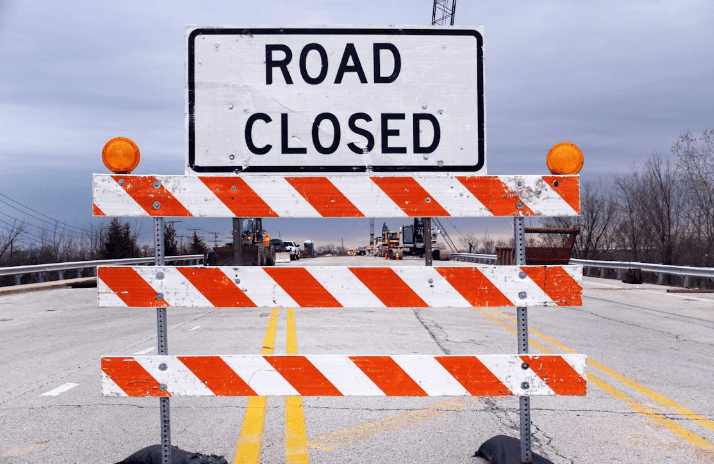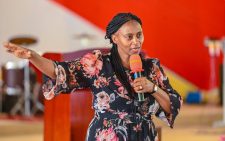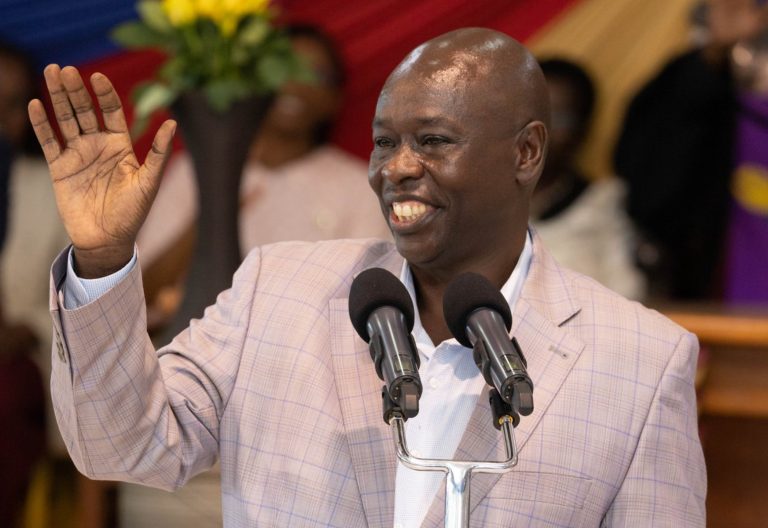Time to re-imagine Kenyan dream with lessons from founding fathers
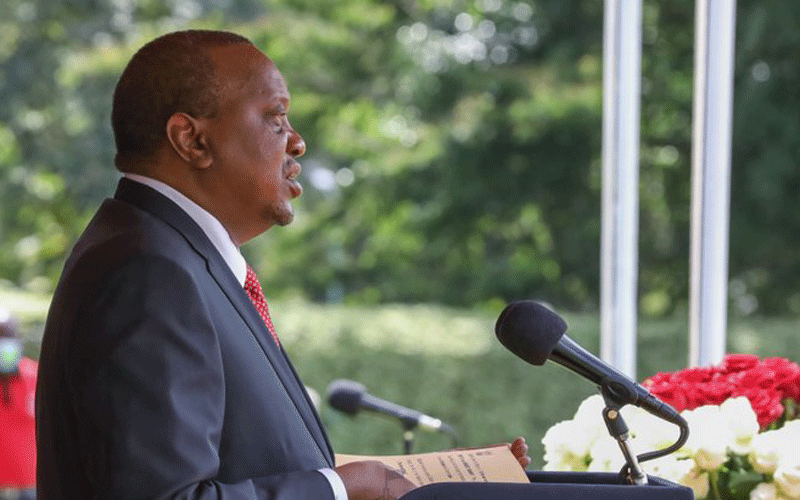
President Uhuru Kenyatta
Fellow Countrymen and Friends,
Today’s celebration is taking place in an unconventional manner. For the first time in 57 years, we are unable to celebrate Madaraka Day at a public gathering because of the Covid-19 pandemic. Instead, I will address you from State House.
First, allow me to salute you and to wish you all a Happy 57th Madaraka Day; a day our founding fathers achieved the right to self-government.
We commemorate this day with fond memories of the struggle for independence and the birth of the Kenyan nation and with it the Kenyan dream.
We are further emboldened by the fact that, united in the struggle, we defeated a giant nation.
And as we fight the coronavirus pandemic today, our victory over the colonisers should remind us that “…This too shall pass”.
Although slowed down by the health crisis and the economic downturn caused by Covid-19, I am further comforted by the teachings of our founding Fathers.
They instructed us to be “…our very best at our darkest moment”. They taught us not to question in the dark, the dreams we dreamt in the light.
Faith and fortitude
And when our dreams hit rock-bottom, they taught us not to abandon them, but to re-imagine them, instead.
They told us that “rock-bottom” is actually a foundation you can build on. This corona moment we are in is, yes, a dark moment, alright, but the founders of our nation require us to be at our very best.
And this demand is not a lofty ideal; they practiced it themselves as they fought to bring us self-rule.
Self-rule required dreaming heroically, embracing the unknown, and offering to die for an ideal. But this was not an easy feat.
As thousands lost their lives at battle, the dream of Madaraka increasingly became nothing but “…a bridge too far”.
Yet in their darkest moments, our founding fathers did not abandon the course. Instead, they re-imagined it, re-grouped and re-engaged differently. Because of their faith and fortitude, they fought the good fight, and won.
And out of this, they gifted us Kenya. On this Madaraka Day, we thank them for this gift and for their teachings on how to re-model an idea in the face of enormous challenges and a raging crisis.
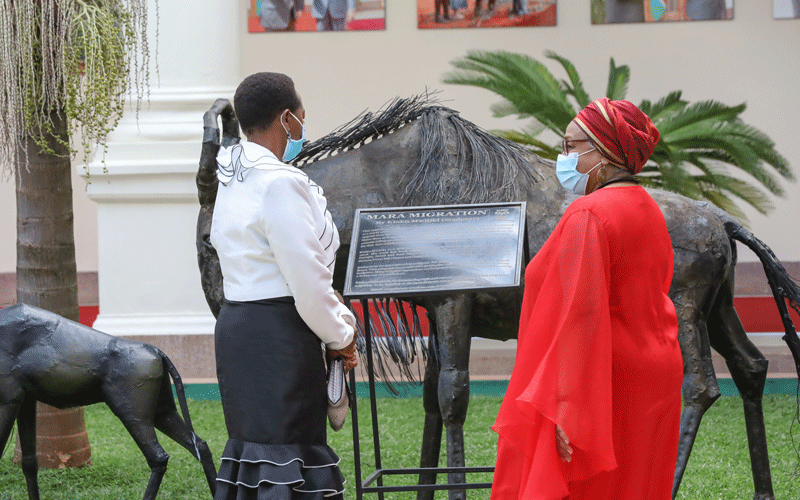
Today, we will ponder the state of the Kenyan dream. And in pondering it, we must remember that Kenya is still a “work in progress”.
Similarly, as we reflect on the progress we have made, as we look inwards for self-introspection, we must not over-criticise ourselves.
If we repeatedly feed our national psyche with negative energy, we become a nation of angry people.
Yet dreams cannot flourish in a negative environment, whose main currency is anger.
This Madaraka Day, I want us to re-imagine Kenya. More so, because, Covid-19 has forced us into a situation where we have to reset our national systems.
But to re-imagine our dream and nationhood, we must reflect on our history, because history has laws that show us the future. We must begin by asking ourselves a number of questions.
How was the Kenyan dream imagined in the very beginning? And how did we come to be?
How did the original blueprint of ‘Project Kenya’ look like? Let us make a historical inquiry in response to these questions.
Two years after the first Madaraka Day, our founding fathers adopted Sessional Paper Number 10 of 1965. It was entitled “African Socialism and its Application to Planning in Kenya”.
This was the vision document for our young nation and was full of dreams for the future to come.
It envisioned a Kenya with an Africanised economy. An economy largely locally owned; whose industries were producing for regional markets; and in which, technology was the light and heat of commerce.
This dream was further articulated by Jaramogi Oginga Odinga in his book: Not Yet Uhuru, published in 1967.
The theme of this book was that Independence was not complete until the economy was in the hands of Africans.
Jaramogi envisioned a Kenya that was unapologetic about it’s ‘Kenyaness’; a Kenya that “could stand on its own feet in a world unfriendly to the African people”; and a Kenya that is “capable of enterprise and development in fields beyond our shambas”.
Tom Mboya, one of our other founding fathers, echoed the dream. But, in his book Freedom and After he reminds us that great things are made of a series of small things. And that the making of a nation is the work of many small events and transitions; small failures and successes.
Right mindset
But Tom Mboya’s main reflections were on constitution-making. He cautioned the nation against constitutional rigidity.
In particular, he argued that the Constitution cannot be useful to a country if it is an end in itself. A good Constitution must be responsive to the aspirations of a nation and be a means to a greater end.
And if the political architecture provided by a Constitution cannot support the growth and progress of a nation, that constitution becomes a cancer to the “body politik”.
On his part, founding father Mzee Jomo Kenyatta imagined a free Kenya as far back as the 1930s, while at Manchester in the UK.
His dream is painted in his book: Facing Mount Kenya published in 1938. In this dream, he cautioned us that, the seed of freedom will only take root if our mindset is focused on the right thing.
In the business of building the nation, he warned, we must not focus on what has been done; our focus should be on what remains to be done.
The right mindset is, therefore, a critical plank to making a dream come to life. Our founding fathers left us with deep teachings and convictions. Now we must summon the teachings as we re-imagine our nation.
We have achieved the dreams of the founding fathers as captured in Sessional Paper Number 10 of 1965 and revised in Sessional Paper Number 1 of 1986.
Further, we have made admirable progress in the implementation of Vision 2030, as my Administration implements the Big Four Agenda.
But this Vision comes to an end in nine years. The urgency for a new vision and a new dream is, therefore, real.
Like Kenya in its 50s, the Holy Bible required nations to hit the reset button every 50 years. On the 50th year, all debts were forgiven, slaves were set free and all land was left unattended.
This action brought renewal to the soul of the nation; healing to the land and a fresh vision to its people. They called it: “the Year of Jubilee”.
But for us to craft this new dream and prepare for the “…great leap forward”, we needed to finish what our founding fathers had started. And this is what we set out to do in our quest to uproot the remnants of ignorance, poverty and disease in our midst.
This inspired my Administration’s transformative agenda for the nation—the Big Four Agenda.
Allow me to give you three examples of unfinished business started by our fathers and which we are endeavouring to complete.
The first one is infrastructure – the backbone and enabler of any economy. And by this I mean Roads, Rail and Ports. At independence, we had only 1,800 kilometres of tarmacked roads.
This is what the colonizers built in 78 years of their occupation between 1885 and 1963. This means every year they only managed to tarmac a total of 23 kilometres.
After independence, our founding fathers built an extra 11,200 kilometres of tarmacked roads. This was done in a period of 50 years at an average of 224 kilometres per year.
This was 10 times what the colonisers had done. But with better technology, planning and efficiencies, my administration has built 1,000 kilometres of tarmacked roads every year.
While we take pride in this achievement, I am cognisant of the fact that this could not have been done without the support of you, my fellow Kenyans.
Regarding ports, our founding fathers saw them as gateways to regional and international markets.
Apart from the Port of Lamu, which will change regional trade dynamically, the other project is the Port of Kisumu. This port was built by the colonizers, but it collapsed at some point.
We have since revived it for strategic purposes. Lake Victoria serves both the northern and the southern corridors.
And with this port, Kenya can service the region from Mwanza and Bukoba in Tanzania, to Jinja and Entebbe in Uganda; and Muhoma Bay in Rwanda at affordable costs and decent timing.
Beyond serving the region, the port is poised to promote the ship-building and repair industry in Kenya.
It will also catalyze the development of other small Ports. And what I am proud of most, is that we revived the dead capital in this port using local expertise and material.
Turning to railways now, this is where my biggest critiques reside. But that’s ok, they are not alone, they are in fellowship with the colonisers who called our railway the Lunatic Express.
Those who called it the railway to nowhere did not realise they were describing Nairobi. Nairobi was nowhere, when the railway was being constructed.
Nairobi and most of our country were created by the railway. And this is why, apart from SGR, I am reviving the defunct Nairobi-Nanyuki railway line, traversing six counties.
The rehabilitation of the Naivasha to Malaba metre gauge line is also about to commence.
The rehabilitation of the central railway line is part of a bigger development strategy to link the hinterlands with the Lamu Port and the Southern Sudan Ethiopia Transport Corridor.
When this happens, Kenyans can expect new markets to emerge along the railway line.
The second example of unfinished business from our founding fathers regards the dignity of our people.
The freedom struggle was about liberating Kenyans from the poverty of dignity, amongst other freedoms.
World economy
Three, to fight what the founding fathers called ignorance, my administration has carried out extensive reforms in the education sector. We have secured the place of pride in the continent as the home to the highest transition from primary to secondary education in Africa.
Additionally, the technical and vocational training is taking root as we seek to reposition our human resource for the ever-evolving world economy. But the human side of these reforms has also focused on electrification.
We have connected 99 per cent of all schools to electricity. And as we did this we also realized that, a substantial part of learning happens at home, even in better days.
That is why we were motivated to do the Last Mile Programme connecting homes to power.
For the record, it is worth noting that after 78 years of colonial rule and 50 years of the independence administrations, a total of 4.5 million households were connected to electricity.
But from 2013, and in only seven years of my presidency, we have connected close to 3.5 million households, bringing the number of households connected close to 8 million.
This means that we have done 15 times more than the previous administrations, to connect our people to electricity.
If electricity and education reforms are supported to fight ignorance, our efforts to fighting disease are in the Universal Health Care programme.
Our health care reforms are far beyond what our Founding Fathers expected.
We have not only dispatched sophisticated machinery to hospitals across counties in order to localise treatment, we have also made this treatment almost free through NHIF.
And we have done this because poor health has a way of indignifying people. But with treatment close by and costs reduced, a patient does not have to sell their property in search of good health.
If this was the dream of our founding fathers , then we are about to achieve it. The coronavirus pandemic has highlighted the urgency on this endeavor.
My third example is about land. A critical motivation for waging the war of liberation against colonial rule was land.
Regaining our land from the colonial masters and laying a personal claim to it was a motivation for the struggle. That is why the “title deed” became a sacred emblem to majority Kenyans.
It is a token earned from a struggle of sorts. After 50 years of independence, six million title deeds were issued by 2013 when I assumed Presidency of our nation. This was a motif of our faith in the struggle.
But in only seven years, an additional 4.5 million title deeds have been issued under my Administration. This was done to keep the promise of our Founding Fathers alive.
Constitutional rigidity
Now I will shift to the two things that remain to be done in order to re-imagine Kenya. The first thing goes back to Tom Mboya and the thoughts he expounds on in his book Freedom and After and his collection of speeches published under the title: “The Challenge of Nationhood”.
Fifty years ago, Mboya warned Kenyans against constitutional rigidity. As I have already mentioned, he told us that a constitution is not an end in itself; it is a means to a greater end.
It is a living document. And if certain elements of the Constitution outlive their historical purposes, they become a cancer.
They must be removed or they will infect the good elements of the mother law.
And this is why we removed section 2(a) that had been added to the independence constitution in the early 1980s.
We removed this section in 1991 in order to create a multi-party system. This section had outlived its historical purposes and it was morphing into a political cancer.
In 2010, we formulated and adopted a new Constitution, altogether replacing the independence Constitution.
I am truly thankful for having been given the mandate to serve as the first President under this Constitution.
Ten years later, I am already discerning a constitutional moment. Not a moment to replace the 2010 Constitution, but one to improve on it.
A moment that will right what we got wrong in 2010. But fundamentally, the constitutional moment I discern is one that will bring an end to the senseless cycles of violence we have experienced in every election since 1992.
And one that will deepen our democratic credentials and lead to a much more inclusive society.
Fellow Kenyans,
We cannot re-imagine our nationhood without changing our political architecture. And we cannot change this architecture without re-engineering our Constitution.
If we have done great things in the area of brick and mortar, the greater things that remain to be done have to do with our governance system.
And we must not be afraid of changing it, if it does not serve our present purposes.
The second thing that remains to be done is the transformation of our civic culture which is at the core of re-imagining a national dream.
And when the drafters of Chapter Six of our Constitution put pen to paper, what they wanted was to bring this culture to order.
But it is difficult to police a political culture. More so if the culture is like the one described by Cannon Donaldson of Westminster Abbey.
In his sermon of March 20, 1925, Donaldson spoke of a culture that thrives in “…Politics without Principle; Wealth without Work; Pleasure without Conscience; Knowledge without Morality; Science without Humanity and Worship without Sacrifice”.
And part of this sermon speaks to our reality as Kenyans. We must transform our civic culture to one that is biased towards duty, hard work and integrity.
We need political leaders totally committed to promoting not self, but what will transform lives of our people in line with what our founding fathers yearned for.
Finally, I will make remarks regarding our national response to the coronavirus pandemic.
As a caring government, and to cushion all Kenyan households against the economic shocks triggered by the pandemic, we continue to progressively roll out targeted measures to sustain livelihoods.
We have reduced taxes to enhance affordability of products and increased the earnings and purchasing power of employees by reducing PAYE, and also incentivised businesses by reducing Corporation Tax.
Last Saturday, I announced the eight-point Economic Stimulus Programme – additionally sending Sh53.7 billion to Kenyan households. As part of this programme, Tourism is a key area of response.
The Tourism Sector has suffered some of the most severe shocks due to restricted movement, termination of international flights and the introduction of social distancing protocols.
Invisible enemy
To jump-start this important sector, and to protect its players from heavy financial losses, my administration will refocus our intervention by offering an initial Sh2 billion exchequer support to hotels and related establishments to ensure they maintain their staff compliment.
We need not be persuaded as a people why we must do everything in our power to conquer this invisible enemy.
But to do so, and regain the ground we have lost, we must come together as a Nation. Each one of us is called to become a Shujaa against this disease.
The containment measures and protocols issued by the government, while absolutely necessary, have constrained our freedoms and our way of life.
I appreciate the anxiety weighing heavy on the minds of parents and children – particularly those preparing for the national examinations. I share the heavy hearts of all the faithful who can no longer congregate and share in worship.
In that regard, and conscious of the emerging trend of infections, I direct as follows: That the Ministry of Education fast-tracks and finalises the ongoing consultations with the stakeholders that will provide an appropriate calendar for gradual resumption of education in the country.
The guidelines should also include protocols to be followed by all learning institutions to guarantee the safety of our children.
Covid-19 heroes
I direct the Ministry of Interior and the Ministry of Health to continue and hasten their engagement with religious leaders; with the objective of developing protocols that will be adopted to guide a more participatory way of worship while guaranteeing the safety of worshippers.
Let me on behalf of an eternally grateful nation, recognise and commend our healthcare workers for giving their all in support of our response to this pandemic.
I also recognise our researchers and innovators, including the team of university students that built a customised ventilator.
The country is also indebted to the thousands of Kenyans who provided meals for our men and women in uniform manning checkpoints, and our artists who raised awareness of the virus through their music and artwork.
We also recognise and commend all those who have selflessly and generously supported the Coronavirus Response Emergency Fund; from the contribution of Sh500 made by 11-year-old Zawadi Mutua, to the Sh300 million personal contribution by Dr. James Mwangi and family.
We applaud all the Kenyans who have donated foodstuffs, clothes, sanitary items and other support items to the fund; which have been channeled to needy and vulnerable Kenyans affected by this crisis.
I would like to end my address today by reemphasising the calling by our founding fathers.
They went through fire and yet founded a nation that we call Kenya today; their voices are calling out to us during this moment of dark uncertainty.
And they are telling us to be our very best in our darkest moment”.
God Bless You. God Bless Kenya. —This is an abridged version of President Uhuru Kenyatta’s speech during Madaraka Day celebrations
